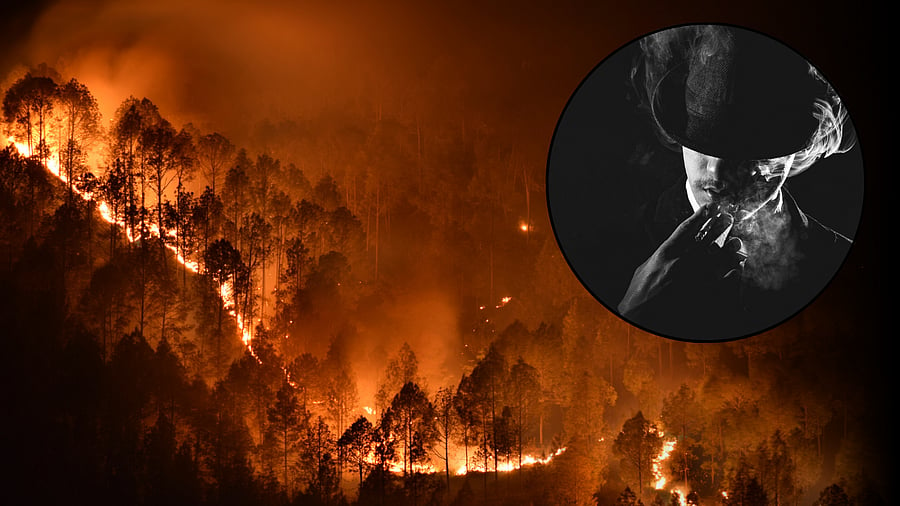
Image showing a wildfire and a mafioso. For representational purposes.
Credit: iStock Photos
"It's not personal, Sonny. It's strictly business."
When Michael Corleone said these words in The Godfather (1972), little did anyone think that they could one day be equated to deadly wildfires decimating Italy.
While wildfires have typically been spoken of in connection with climate change, it appears that the mafia in Italy may have a hand in setting off these deadly blazes.
A recently published study by a UC Berkeley researcher that blurs the line between geography and criminology has found strong links between a surge in wildfire outbreaks in the Italian island of Sicily and the activities of the infamous mafia.
While Sicily today experiences over 8,000 wildfire outbreaks annually, a surprisingly small percentage of these outbreaks are natural, with over 70 per cent being caused by arson linked to personal vendettas, land disputes, and the weaponisation of fire by the mafia.
Although increasing heat waves and dry scrirocco winds create the perfect conditions for the outbreak of wildfires in southern Italy, it is often people who light the final spark, primarily for power or profit, or both.
The author of the study, Geography PhD student Lauren Pearson, spent months carrying out ethnographic research, speaking to locals, prosecutors, environmental groups and the police in Sicily to uncover the links between mafia activity and wildfires.
She found that while weather conditions and inaccessible forrested terrain created the perfect stage for uncontrollable fires, a large chunk of these fires were linked to criminal activity.
While not all of this criminal activity is directly linked to the mafia—fires are often set by seasonal workers looking to extend firefighting contracts, farmers looking to clear forest land, people with vendettas etc.—they all take place in mafia-controlled territory, making it very likely that they happen with the sanction of the mafia.
But, what does the mafia stand to gain by setting thousands of acres on fire? Fires, the study explains, precipitate large-scale expenditures, from contracts for firefighting, to clean-up operations and rebuilding activities.
The mafia, being a multilayered criminal enterprise that has networks from the grassroots to the administrative level, stands to benefit from these fires by lapping up much of the expenditure that goes into fighting wildfires and subsequent rebuilding.
That's not all. Evidence also suggests that mafia organisations in Sicily may also be trying to tap into clean energy transition funds by using wildfires to clear and procure land to broker deals for wind and solar infrastructure in the region.
"The dynamic of the Sicilian mafia is changing within this particular moment of climate change. They’re taking advantage of fire similar to how they might have weaponised postwar transitions or transitions to more urban environments," study author Pearson said.
Simply put, mafia organisations in the area appear to be playing a two-pronged game, sparking destructive fires and siphoning the funding intended to address them.
Beyond mere power and profit, the setting of these fires in mafia-controlled territory is also symbolic—a show of power to remind everyone that they are on mafia land.
"Political, economic and societal issues are part of the dialect that keeps producing mafia space. Fire is a new iteration of how the mafia reproduces themselves and reproduces their landscapes anew," Pearson explained.
Despite extant laws and ongoing efforts to disincentivise arson in Italy, people familiar with these measures told CNN that they can be hard to implement, as they require immense efforts in monitoring and tracking.
Given this reality and an increasingly warming planet, the mafia's role in Sicily's wildfires may well grow in the years to come—"There is a weaponisation happening of climate change," Pearson noted.
The study is titled Land on fire: The spatial production of the mafia, and can be accessed here.
